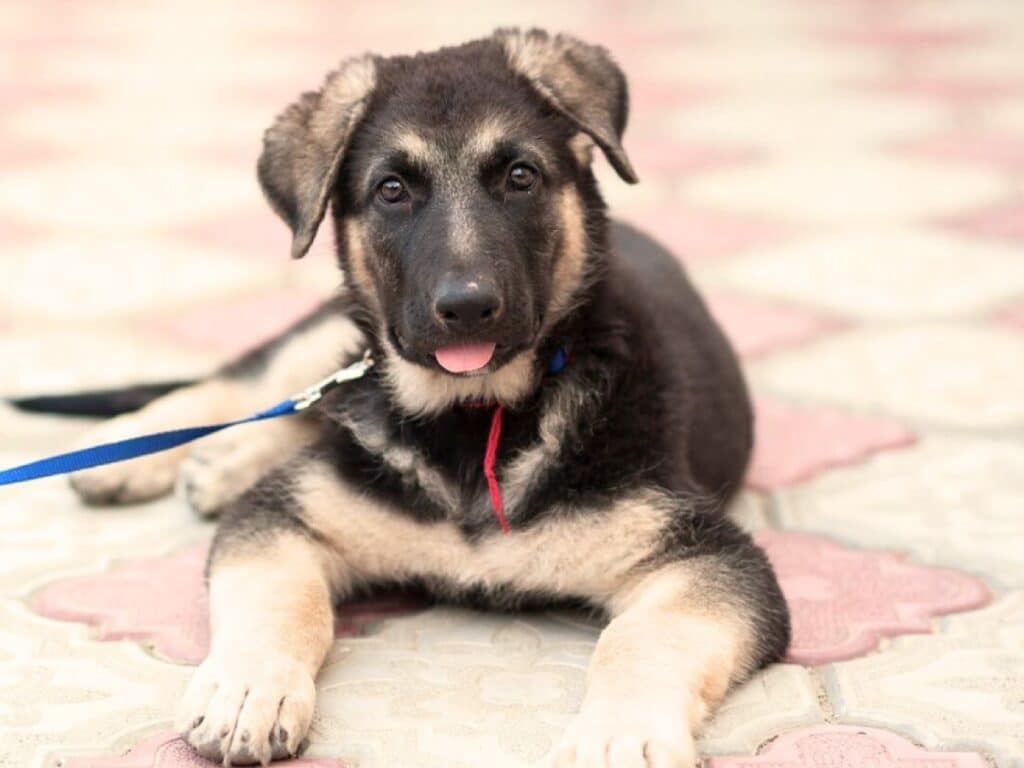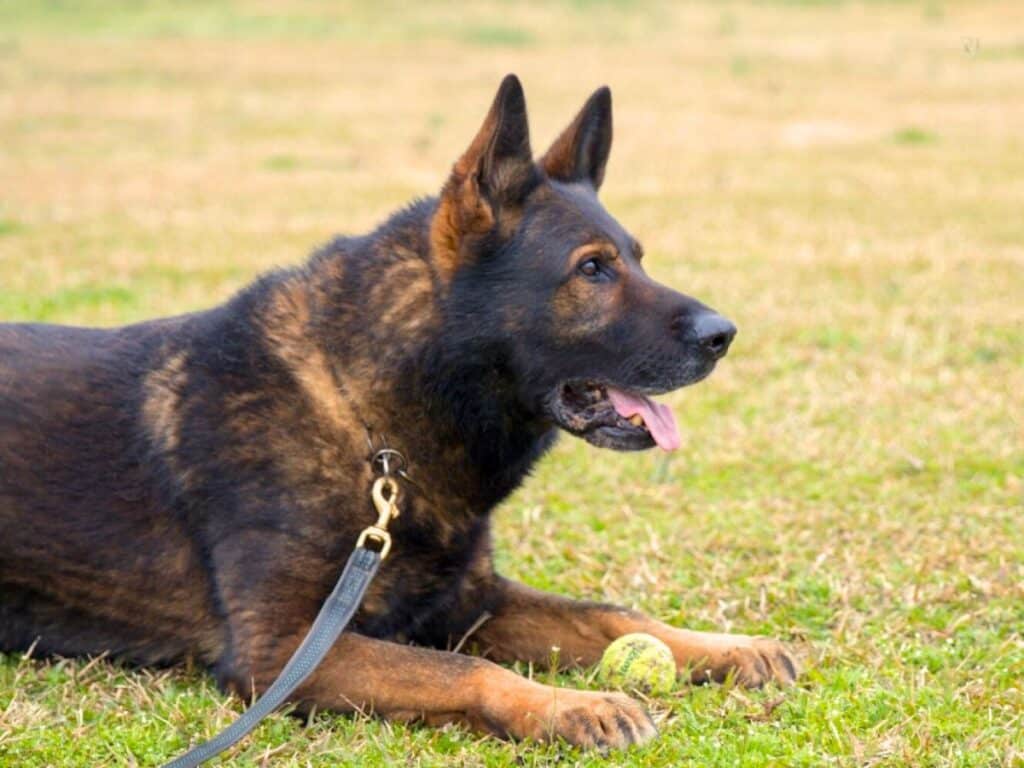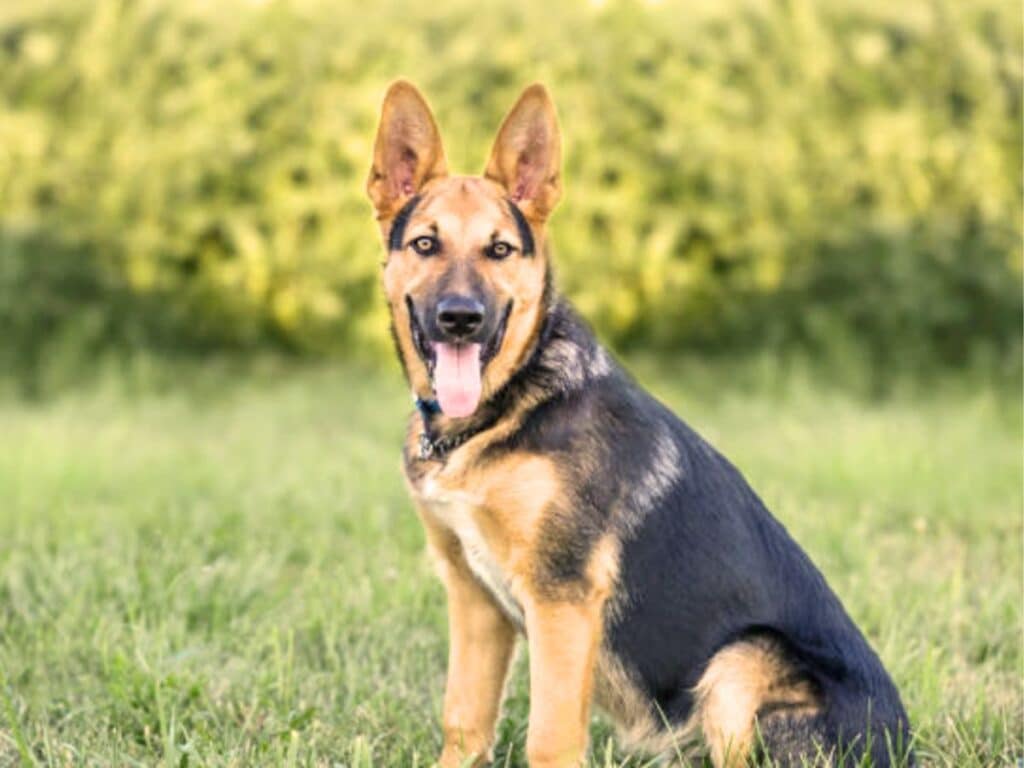Welcome to this article about 2-month-old German Shepherd puppy! As a new owner of a pup, you may have questions about their care, training, and development.
In this article, we’ll explore the key aspects of owning and raising an 8-week-old German Shepherd, from their nutritional needs to their socialization, training, and exercise requirements.
So let’s dive in!
2-Month-Old German Shepherd Puppy
The following table provides a comprehensive overview of the physical traits, behavior patterns, and general care needs during this crucial growth stage of an 8-week-old German Shepherd.
| Size | 6 – 9 inches |
| Weight | Typically around 11 – 20 pounds |
| Coat | Soft, fluffy puppy coat; may vary in color |
| Eyes/Ears | Bright, alert eyes; ears are still floppy |
| Teething | In the process of teething, chewing on objects |
| Energy Level | High energy bursts followed by naps |
| Socialization | Curious and eager to explore surroundings |
| Playfulness | Enjoys playing with toys, littermates, and people |
| Training | Beginning basic commands; short attention span |
| Sleep Patterns | Naps frequently, may sleep around 18-20 hours a day |
| Feeding | Multiple (4-5 meals) small meals per day, mother’s milk or puppy food |
| Bathroom Habits | Still learning to control bladder and bowel movements |
| Social Bonding | Developing attachment to owners and littermates |
| Vocalization | Whining, whimpering, and occasional barking |
| Health Care | Should have received initial DHPP/DA2PP vaccinations and other non-core vaccines |

2 Month Old German Shepherd Weight
A 2 month old male German Shepherd puppy typically weighs between 16 to 20 pounds, whereas, a female GSD pup can weigh between 11-17 pounds.
At two months old, these puppies are still developing their physical characteristics. The size and weight of an 8-week-old German Shepherd can vary depending on genetics and gender.
It is important to note that these numbers are just averages and not definitive measurements. Some puppies may weigh more or less than these ranges depending on various factors such as diet, exercise routine, and overall health.
How Big is a 2 Month Old German Shepherd?
The height of a 2-month-old male German Shepherd is around 7 to 9 inches at the shoulder while females can be 6 to 9 inches tall at this age.
As they grow older, they will continue to develop their muscular build and strong bone structure.
It’s important to note that the growth of a German Shepherd puppy can vary from dog to dog and will continue for several months. Factors such as genetics, nutrition, and exercise play a major role in their development process.
For more information on your GSD’s growth, you should refer to my article German Shepherd Growth Chart By Month. This article serves as a guide, providing key information on size, weight, and other crucial markers from puppyhood to adulthood of a GSD pup.


What Does a 2 Month Old German Shepherd Look Like?
8 week old German Shepherd puppies are small to medium-sized. They are 6 – 9 inches tall and can weigh between 11-12 pounds.
They typically have a soft and fluffy puppy coat.
Their eyes are usually dark and expressive, while their ears are still in the process of standing up and may appear floppy or partially erect.
The puppy at this age is in the early stages of teething. You may notice them chewing on objects to soothe their gums and aid in the teething process.
Their bodies are still developing, and they may have a slightly awkward or clumsy appearance as they grow into their legs. However, they are capable of standing on their own and will continue to mature into strong, agile adults.
Overall, they have a cute and endearing appearance, with a blend of awkward movements and adorable expressions that are characteristic of puppies in their early stages.
Vaccinations are extremely important at this age for your puppy, please go through my article: German Shepherd Puppy Vaccination Schedule to learn more about the topic.
Feeding a 2-Month-Old German Shepherd
Crafting a suitable 2-month-old German Shepherd puppy diet is crucial to meeting their nutritional requirements and fostering optimal growth and development.

What To Feed a 2 Month Old German Shepherd Puppy?
Feed a 2-month-old German Shepherd puppy high-quality puppy food, formulated for large breeds. Divide daily portions into 3-4 meals, adjusting for weight gain. Provide fresh water, avoid human food, and consult your vet for specific dietary recommendations.
Puppy Food:
Choose a high-quality commercial puppy food that is specifically formulated for large-breed puppies.
German Shepherds are known for their size, so a formula designed for large-breed puppies will have the appropriate balance of nutrients to support healthy bone and joint development.
Avoid foods that contain fillers or artificial additives. It is also important to choose a food that contains essential nutrients like DHA, which supports brain development.
High Protein and Moderate Fat Content:
When selecting a puppy food, make sure the first ingredient is a high-quality source of animal protein, such as chicken or lamb.
Look for a puppy food that contains higher levels of quality protein (at least 25%) and moderate fat.
Protein is essential for muscle development, while fat provides a concentrated source of energy.
Keep Them Hydrated:
Always provide fresh, clean water for your puppy. Hydration is crucial for their overall well-being.
RELATED: Do German Shepherds Drink a Lot of Water?
Avoid Human Food & Table Scraps:
Avoid feeding your puppy human food, especially those that are toxic to dogs (such as chocolate, onions, garlic, and certain artificial sweeteners).
Stick to a balanced puppy diet to ensure they get all the essential nutrients.
To learn more about the foods that you should and shouldn’t feed your GSD pup, please check out my article: What Do German Shepherds Eat?

How Much Should a 2-Month-Old German Shepherd Eat?
As a general guideline, a 2-month-old German Shepherd puppy should eat about 1.5 to 2 cups of puppy food spread over 4 – 5 small meals throughout the day.
The amount of food you give your pup also depends on several factors, including their weight, activity level, and overall health.
Most commercial puppy foods provide feeding guidelines based on the puppy’s weight. Follow the recommended daily amount, but be attentive to your individual puppy’s needs.
It’s important not to overfeed your puppy or give them too many treats throughout the day. Overfeeding can lead to obesity and other health problems later in life. Instead, focus on providing high-quality food that meets their nutritional needs.
When feeding your puppy, it’s important to establish a consistent routine. Choose specific times of the day when you will feed them and stick to the feeding schedule as closely as possible.
If you’re unsure about how much food to give your puppy, consult with your vet. They can provide guidance based on your puppy’s individual needs and help ensure that they are receiving all the necessary nutrients for optimal growth and development.
Since your puppy is still very young, I suggest you go through my article How Much To Feed a German Shepherd Puppy: GSD Feeding Chart By Age. This article covers everything (nutritional needs, portion sizes, meal frequency, etc.) you need to know about feeding your GSD at every stage of his/her life.

How To Train a 2 Month Old German Shepherd Puppy
Training a 2-month-old German Shepherd puppy requires patience, consistency, and positive reinforcement techniques. Here are some tips that worked really well when I started training my GSD pup:
Start with basic commands
Begin by teaching your puppy simple commands like “sit,” “stay,” and “come.” Use treats as rewards and repeat the commands consistently until your puppy understands and obeys them.
Use short, clear commands, and be consistent with your language.
RELATED: German Shepherd Training For Beginners
Positive reinforcement
Use treats, praise, and positive reinforcement when your puppy follows a command correctly.
Reward immediately to reinforce the association between the behavior and the reward.
Short training sessions
Keep training sessions short, around 5-10 minutes, to match the puppy’s attention span.
Multiple short sessions throughout the day are more effective than one long session.
Use a quiet and distraction-free environment
Choose a quiet place with minimal distractions for training sessions.
Once your puppy learns basic commands, gradually introduce distractions to improve focus.

Socialize your puppy
Expose your puppy to various environments, people, and other animals to promote positive socialization.
Ensure the experiences are positive and not overwhelming for the puppy.
Crate training
Introduce your puppy to a crate as a safe and comfortable space.
Use positive reinforcement to encourage your puppy to enter the crate voluntarily.
RELATED: How to Crate Train a German Shepherd Puppy?
Basic house training
Establish a routine for bathroom breaks, and take your puppy outside frequently, especially after meals and naps.
Praise and reward your puppy for eliminating outdoors.
Avoid using harsh punishment as it can be counterproductive and harm the bond between you and your puppy.
Be patient and consistent in your training approach. Consistency is key to helping your puppy understand and learn.
RELATED:
- 9 Week Old German Shepherd: Everything You Need To Know
- 11-Week-Old German Shepherd: What To Expect
- 3 Month Old German Shepherd: How to Ensure a Healthy & Happy Pup

Unlock your puppy’s full potential with “Brain Training for German Shepherds.” Elevate your training experience with engaging games, expert insights, and tailored exercises designed to stimulate your pup’s brilliant mind.
How to Potty Train a 2 Month Old German Shepherd
Potty training a 2-month-old German Shepherd can be a challenging but necessary task. Here are some steps to help you successfully potty train your German Shepherd puppy:
Establish a Routine:
Take your puppy outside frequently, especially after waking up, after meals, and after playtime. Puppies usually need to go to the bathroom shortly after these activities. (Source)
Take your puppy out first thing in the morning and last thing at night.
Choose a Designated Potty Area:
Take your puppy to the same spot outside each time. The scent will help them associate the area with the bathroom.
Use a Command:
Choose a command like “Go potty” or “Do your business” and use it consistently while your puppy is eliminating. This helps them associate the command with the action.
Be Patient:
Stay with your puppy outside until they’ve finished. Puppies can get easily distracted, so be patient.

Reward Good Behavior:
Immediately praise and reward your puppy when they go potty outside. Use treats, verbal praise, or both to reinforce the positive behavior.
Supervise Indoors:
Keep a close eye on your puppy when they are indoors. If you catch them in the act of eliminating inside, interrupt them with a sharp “no” and take them outside immediately.
Create a Confined Space:
When you can’t supervise your puppy, consider confining them to a crate or a small, puppy-proofed room. Dogs generally don’t like to soil their living area, and this can help prevent accidents.
Clean Accidents Thoroughly:
If accidents happen, clean the soiled area thoroughly to remove any scent markers. This helps discourage your puppy from using the same spot again.
Establish a Feeding Schedule:
Feed your puppy on a regular schedule. This will help regulate their bathroom habits.
Puppies are learning, and accidents will happen. Stay patient and avoid punishment for accidents. Instead, focus on reinforcing good behavior.
Remember that every puppy is different, and the time it takes to potty train may vary. Consistency and positive reinforcement are essential for successful training.
I wrote a complete article on this topic as it’s something I’m often asked about. You can check it out here, How To Potty Train a German Shepherd Puppy?

Check out this video of a well trained 2 month old German Shepherd pup showing off her skills…
How Much Does a 2 Month Old German Shepherd Sleep?
On average, a 2-month-old German Shepherd may sleep around 18 to 20 hours per day. This sleep includes both short naps and longer periods of sleep during the night.
Puppies typically sleep a significant amount of time as they require a lot of rest for growth and development.
It’s important to note that individual puppies may vary in their sleep patterns, and factors such as activity level, environmental stimuli, and overall health can influence their sleep duration.
Puppies tend to have bursts of energy followed by periods of rest throughout the day.
Establishing a consistent bedtime routine and ensuring your puppy gets enough mental and physical stimulation during waking hours can also help regulate their sleep patterns.
RELATED: Do German Shepherd Puppies Sleep A Lot?

How to Take Care of a 2-Month-Old German Shepherd?
Taking care of an 8 week old German Shepherd puppy involves several important aspects, including nutrition, training, socialization, exercise, grooming, and regular veterinary care. Here’s a guide to help you:
- Nutrition:
- Feed a high-quality puppy food designed for large breeds.
- Provide multiple small meals throughout the day to accommodate their small stomach.
- Follow the feeding guidelines on the puppy food packaging.
- Ensure access to fresh water at all times.
- Veterinary Care:
- Schedule a visit to the veterinarian for a health check-up, vaccinations, and deworming.
- Discuss a vaccination schedule with your vet to protect against common diseases. (Source)
- Training:
- Start with basic commands like “sit,” “stay,” and “come.”
- Use positive reinforcement, such as treats and praise, to reward good behavior.
- Keep training sessions short (5-10 minutes) due to a short attention span.
- Socialization:
- Expose your puppy to various environments, people, and other animals to build positive social experiences.
- Enroll in puppy socialization classes.
- Exercise:
- Provide age-appropriate play and exercise to stimulate physical and mental development.
- Avoid strenuous exercise, as puppies are still growing.
- Grooming:
- Brush your puppy’s coat regularly to maintain cleanliness and get them used to the grooming process.
- Introduce gentle handling of paws, ears, and mouth to facilitate future grooming.
- Crate Training:
- Introduce your puppy to a crate as a safe and comfortable space.
- Use positive reinforcement to create a positive association with the crate.
- House Training:
- Establish a consistent routine for bathroom breaks.
- Praise and reward your puppy for eliminating outdoors.
- Supervise indoors to prevent accidents.
- Sleep:
- Provide a comfortable and quiet sleeping area.
- Expect your puppy to sleep around 18-20 hours a day, with short play and awake periods.
- Chew Toys:
- Provide appropriate chew toys to help with teething.
- Avoid leaving harmful objects within reach.
- Love and Attention:
- Spend quality time bonding with your puppy.
- Provide affection and positive interaction to strengthen the bond between you and your German Shepherd.
Remember that patience and consistency are crucial when caring for a puppy. Adapt your care routine based on your puppy’s individual needs, and always consult with your veterinarian for specific advice related to your puppy’s health and development.
RELATED: How Much Exercise Does a German Shepherd Puppy Need?
Conclusion
In conclusion, caring for a 2-month-old German Shepherd requires attention, patience, and dedication. Providing your puppy with proper nutrition, exercise, socialization, and grooming can help support their physical and mental development, while also promoting their overall health and well-being.
Remember to schedule regular checkups with your veterinarian and to provide positive reinforcement and rewards for good behavior during training and playtime. With proper care and attention, your 8-week GSD can grow into a healthy, happy, and well-behaved adult dog.
FAQs
1. What size collar for 8-week-old German Shepherd?
Choose a collar size with an adjustable range of approximately 8 to 12 inches to accommodate the small neck size of an 8-week-old German Shepherd.
2. What size harness for 8-week-old German Shepherd?
Opt for a small or extra-small harness suitable for a puppy with a chest circumference of around 12 to 18 inches, providing a secure fit for an 8-week-old German Shepherd.
3. What size crate for 8-week-old German Shepherd?
Select a crate that allows your 8-week-old German Shepherd to stand, turn around, and lie down comfortably. A crate with dimensions around 24 inches in length is typically suitable.
4. What to expect from an 8-week-old German Shepherd?
At 8 weeks, expect a small-sized, fluffy puppy with bursts of energy and frequent naps. They’ll be teething, exploring their surroundings, and forming strong attachments to their human family. Socialization, basic training, and regular veterinary care are important aspects to focus on.
5. What should be the schedule of an 8-week-old German Shepherd puppy?
Establish a schedule that includes regular feeding times, bathroom breaks, play, and nap periods. Aim for around 3-4 meals a day, frequent bathroom outings, short training sessions, and ample time for rest, as 8-week-old German Shepherds typically sleep around 18-20 hours a day.
FOR FURTHER READING:




